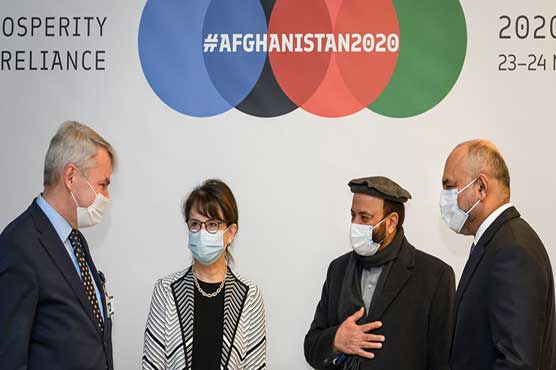World renews conditional aid for Afghanistan with ceasefire call

At a virtual global donor conference, donors pledge around $12bn in aid over 4 years.
GENEVA (AFP) - The international community on Tuesday pledged around $12 billion in aid for Afghanistan over the next four years -- but tied its money to rights being upheld in ongoing peace talks with the Taliban.
At a virtual global donor conference hosted from Geneva, countries affirmed their commitment to propping up a country beset by violence between the Taliban and government forces, rampant corruption and an imminent withdrawal of US troops.
They also called for an "immediate permanent and comprehensive ceasefire", as at least 14 people were killed in central Afghanistan when two blasts ripped through the historic city of Bamiyan, home to many members of the mainly Shiite Hazara ethnic minority.
The twin bombing marked the latest big attack in Afghanistan, where violence has surged in recent months even as Taliban and Afghan government negotiators are meeting for peace talks in Qatar.
Donor nations meet every four years to pledge aid to Afghanistan, which is almost entirely reliant on foreign assistance despite years of promised reforms and attempts to grow the economy.
Efforts to rebuild Afghanistan began soon after a US-led invasion ousted the hardline Taliban regime from power in the wake of the September 11, 2001 attacks on the United States.
The conference underlined that the gains made over the last 19 years must be secured, namely democracy, the rule of law and human rights -- notably those of women, minorities and children.
Impressive figure
"The donors pledged more than $3 billion for the first year of the upcoming quadrennial, with annual commitments expected to stay in the same level, year-on-year," said Finnish development minister Ville Skinnari, who co-chaired the virtual donors conference in Geneva. "This would amount to some $12 billion during four years." The previous 2016 conference in Brussels raised $15.2 billion.
Afghan Foreign Minister Mohammad Haneef Atmar said the figure was "impressive" as it had come with every nation struggling with the economic crisis triggered by the Covid-19 pandemic. "We were extremely pleased with your joint call for an immediate ceasefire," he added. "The Taliban must hear that: that it s not just the Afghan people who demand a ceasefire. It s the whole of the world community."
The Taliban and the Afghan government have been engaged in peace talks in Qatar since September 12 but no progress has been announced so far. However, the negotiations in Doha are ready to advance to the next stage, sources close to the talks said Tuesday, despite opposition from President Ashraf Ghani.
The talks quickly became bogged down by disputes on the agenda, the basic framework of discussions and religious interpretations. But agreement has now been reached on all issues that had stood in the way, according to the sources.
Ghani, however, objects to wording that refers to his administration and the Taliban on an equal basis as "parties to the war", an Afghan official said Tuesday. "Our commitment to negotiations with the Taliban remains firm," Ghani told the Geneva conference via video-link from Kabul.
But he said violence had "skyrocketed" since a US-Taliban deal in February paved the way for the withdrawal of foreign forces by May 2021. "Plans to achieve peace did not materialise as imagined. Suffering and killing continues to plague Afghans on a daily basis. It is unbearable," Ghani said.
Virtual global hug
In Geneva, 66 nations and 32 international organisations came together to agree a financial package tied to conditions on solidifying the gains made since 2001. However, they accepted that "humanitarian aid will be needed for foreseeable future".
Deborah Lyons, the UN special envoy for Afghanistan, said the money came with accountability attached and was not coming for free. "Today, Afghanistan got a big virtual global hug," she said. "But even a hug has conditions and consequences."
Concerns are high that advances, especially in the area of women s rights, could be lost as the Taliban unleashes further violence. The United States announced last week that another 2,000 US troops will exit Afghanistan by January 15 -- less than a week before Joe Biden is set to take over as president -- leaving just 2,500 behind.

